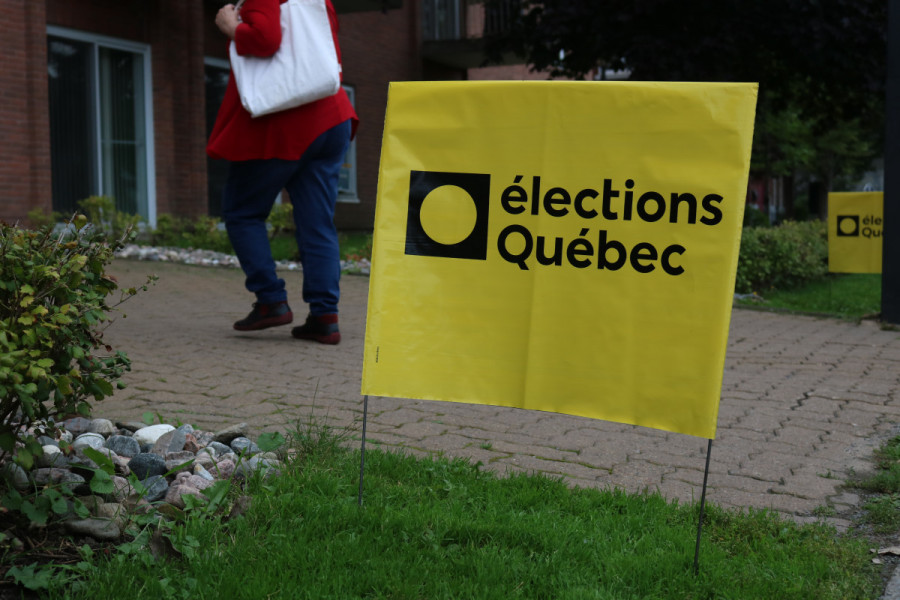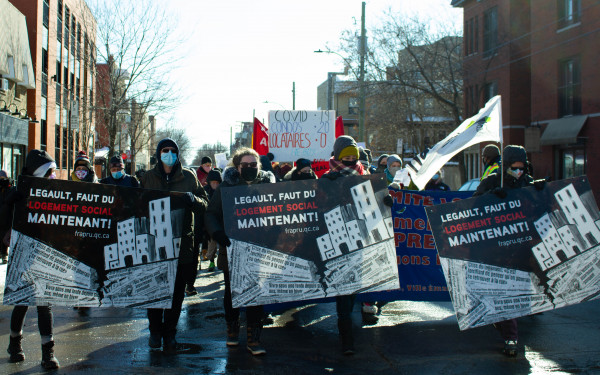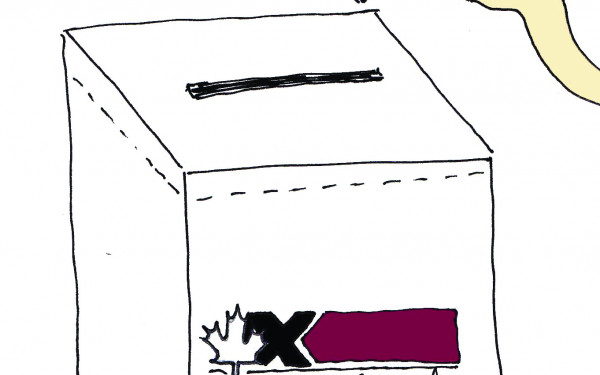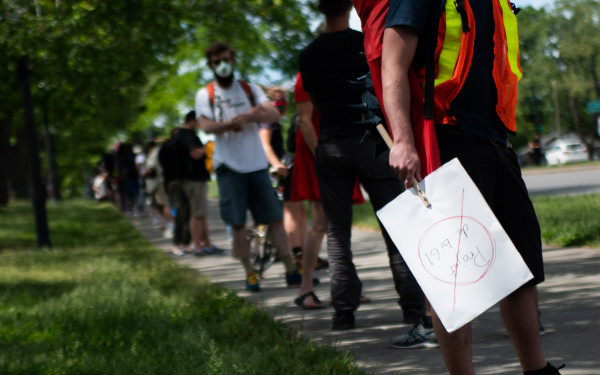What the Hell is Going on in the Provincial Election?
A Guide for New Students on Quebec’s Political Parties
The Quebec provincial election is coming up on Oct. 3. Streets across town have been lined with election posters promoting candidates and parties for weeks now.
For non-Quebecer members of the Concordia community, the provincial election may feel overwhelming. It can be hard to stay informed on important issues—especially since Quebec’s politics are unique compared to other provinces.
Here is the quintessential guide for students to better understand the parties and their platforms.
An Endless List of Provincial Parties
There are 27 registered parties in the province of Quebec, representing different positions and ideas from across the political spectrum. This article will highlight the eight with the most public attention.
Coalition Avenir Québec
Premier François Legault’s Coalition Avenir Québec is the current party in power, and the most popular amongst Quebecers. According to 338 Canada polls, the CAQ is polling at 40 per cent and expected to win 93 of 125 seats. According to polling experts, this party is almost certain to win the most number of seats and form government this election. Therefore, it is important to know their platform, and how it may impact students.
Despite their popularity, the CAQ remains controversial with anglophones, religious minorities and newcomers to Quebec, largely due to two bills passed while in governance–Bill 21 and Bill 96. Bill 21, introduced by the CAQ, prevents public servants, such as prosecutors, police officers and teachers, from wearing religious symbols in their workplace.
This bill has been harmful to many newcomers in the public sector, including religious minorities such as hijabi Muslim women, or people of other faiths requiring religious symbols be worn.
Bill 96 also excludes many immigrant communities due to its restrictions on communication and access to public services. The bill amended the Charter of the French Language and seeks to increase the use of the French language in Quebec. This means that schools and businesses will need to enforce the use of the French language even more.
One part of the bill requires immigrants communicate in French with public agencies within six months of living in the province. This is extremely difficult for many newcomers, because the ability to become fluent in French in six months, is impractical for many whose first language is not the French language. A leaked study ordered by the CAQ found that it is impossible to learn French in only six months.
Furthermore, the CAQ believes in limiting the number of immigrants coming into Quebec, and wants to reduce Quebec’s immigrant reception capacity by 20 per cent, or to 46,000. The number of immigrants was reduced to 50 200 in 2021. Francois Legault believes that by limiting immigration to Quebec, it will help protect the French language.
The CAQ is centered around Quebec nationalism. While they do not advocate for Quebec becoming an independent state, their goal is to promote the Quebec national identity and French language in Canada.
Quebec Liberal Party
The Quebec Liberal Party is second in the polls, with a current vote projection of 18 per cent. Its leader is Dominique Anglade. The PLQ differs from the CAQ’s Quebec-centered approach, being unabashed pro-Canada federalists.
Unlike the CAQ, the PLQ believes that Bill 21 should be reversed to allow public workers to wear religious symbols. The Liberal party is more inclusive when it comes to language restrictions, indicating that they believe public services should be able to serve people’s needs rather than protect French.
They believe in a higher annual maximum threshold for immigration to Quebec, set at 70,000 if elected, stating the purpose is to serve regional needs. The Liberal Party believes employers are struggling to find workers, thus proposing an immigration increase to meet the labour shortage.
Quebec Solidaire
Those from outside Quebec may confuse this party with the left-leaning federal New Democratic Party (NDP), but Quebec Solidaire has a much more inclusive and progressive platform. The party’s central tenets are focused on environmental issues, equality, feminism and opposition to neoliberalism.
QS also believes in an independent Quebec. As a progressive party, they also have vowed to remove Bill 21, and allow religious symbols to be worn in public positions.
They believe that separatism will allow Quebec to become more inclusive and diverse, without the federal government’s control of the immigration process. QS disagrees that immigration is a threat to the French language, but still voted for Bill 96.
Parti Conservateur du Québec
The Conservaitve Party of Quebec is fourth place in the polls, with a current vote projection of 14 per cent. Their leader is Eric Duhaime.
Similar to the Liberals, the PCQ is a federalist party, and believes the province should work with the rest of Canada. The Conservative party is against Bill 96 and has been campaigning on the importance of bilingualism in the province.
However, the PCQ believes in admitting an annual threshold of 50,000 immigrants into Quebec. They also believe that immigrants should integrate into Quebec culture, adapt western values, learn French and join the workforce.
Therefore, when it comes to the rights and acceptance of newcomers to Quebec, the Conservative party takes a restrictive and ethnocentric approach. When it comes to diversity and inclusion, the PCQ is by far the weakest advocate—they strongly support Bill 21.
Parti Québécois
The Parti Québécois is a firm advocate of Quebec sovereignty and nationalism. Their leader is Paul St-Pierre Plamondon, and they are currently polling in fifth place. With 14 per cent of the vote , they are projected to win three seats.
Out of all the parties discussed in this article, the PQ believes in reducing the immigration threshold the most, to 35,000 immigrants yearly, which they believe will “better francize and regionalize newcomers.”
The PQ advocates strongly for the preservation of the French language and Quebec culture, believing that “mastery of French” should be the first criteria of immigration to Quebec.
The Parti Québécois, like the CAQ and PCQ, also believes that government employees should not wear visible religious symbols, supporting Bill 21.
Parti Vert du Québec
Not present in the polls, the Parti Vert du Quebec (PVQ) is one of the most left-leaning and progressive parties campaigning in this election. Their current leader is Alex Tyrell, and the party is based around “green politics” and eco-socialism.
The PVQ believes in protecting the environment, and argues that environmental protection should be central to all government decisions. They prioritize inclusivity and oppose racism and discrimination, opposing Bill 21.
When it comes to immigration, the PVQ have a very inclusive stance, believing in increasing the threshold by 20 per cent annually “in order to stimulate the economy, reunite families and allow immigrants to contribute more to Quebec society.”
They are a federalist party and believe it is in Quebec’s best interest to remain a part of Canada, citing the need to work with other progressive groups across Canada to protect the environment.
In a statement provided to CBC’s vote compass, they said they supported not requiring fluency in French in order to immigrate to Quebec. Instead, they said they would rather let newcomers learn French with assistance from the government.
Bloc Montreal
Not present in the polls or CBC’s vote compass, Bloc Montreal is a new party campaigning this election. The party was founded in 2022 by its leader, Balarama Holness. This party is unique for its Montreal-centred approach, as it seeks to represent the interests of Montrealers.
BMtl is campaigning on Montreal as a city-state with specific powers, bilingualism and the rights of minorities. They support immigration, and believe it is important to sustain economic growth and industry. They support increasing immigration levels to a threshold of 80,000 to 90,000 annually.
BMtl also rejects the controversial Bills 21 and 96.
Parti Canadien du Quebec
The final party making appearances on posters around the city is the Canadian Party of Quebec. The name of this party is self-explanatory, as its main purpose is to advocate for federalism and the maintenance of Quebec-Canada relations.
The party rejects Bill 96 and 21, highlighting its commitment to protecting Quebec’s English-speaking communities’ rights. It believes newcomers should be able to receive public services in both languages.
A Political Headache
Although it can be hard as a new student at Concordia to absorb an unfamiliar political landscape, it is important for us to stay connected to these parties' policy platforms and to engage in discussion with our peers about these issues.
Especially since so many Concordia students do not speak French and may be interested in fully immigrating to Quebec after their studies, these issues will largely impact their futures. There is a lot riding on this election, and students who can vote should be fully informed before casting their ballots on Oct. 3.







